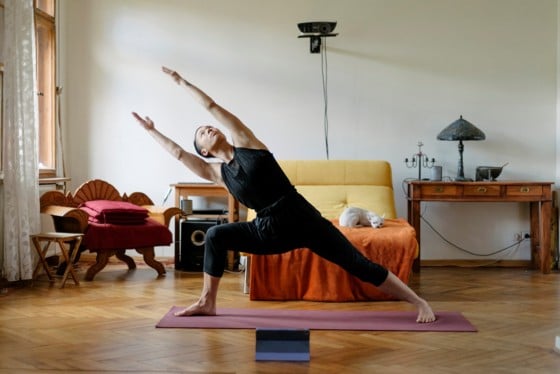Fitness Motivation: Finding the Drive
10 tips to get you motivated

Have the motivation but the couch is too comfy? Well, you're not alone. Find out which motivator you are and what stands in your way. In this article, we'll give you 10 tips you can use to get your drive up.
- Fitness motivation: Which motivational type are you?
- What motivates you?
- Inner couch potato: 5 reasons for your lack of motivation
- 10 tips to help save your motivation
Fitness motivation: Which motivational type are you?
First it was jogging, then handball and then the gym. Are you the type of person to pick up a new hobby or fitness program with enthusiasm only to stop after a while? Then it may have to do with your motivational type. To put it differently, are you training against your motivational type instead of with? Fitness motivation can be roughly divided into two archetypes:
- 1. Intrinsic motivator
- The motivation for fitness and sport comes from within.
- The focus is on the benefits of sport for health, fitness and well-being.
- This type needs little support from outside.
- The motivation for fitness and sport largely from outside.
- The focus is on comparison and competition with others.
- This type needs more support and inspiration.
- 2. Extrinsic motivator
For the intrinsically motivated, a fitness challenge in which he or she competes with others can be demotivating. For the extrinsically motivated type, however, it's just what the doctor ordered. Find out for yourself how much support you need for your successful training without trying to change your type. Even though it is often said that intrinsic motivation is the holy grail of sport, even intrinsically motivated athletes need some external motivation from time to time.

What motivates us to be active?
Friends, health, appearance - what actually motivates us to be active? For children and young people, the environment is a decisive factor. A study by the US National Library of Medicine National Institues of Health came to the conclusion that parents are particularly motivating when it comes to sports in clubs. In outdoor sports and among young people, it's their friends.
And what about the adults? Here, too, friends and the environment play a significant role. For example, a study by ResearchGate from 2014 showed that 71 percent of the 1,013 people surveyed were motivated to exercise by meeting friends and 80 percent would exercise more often if they'd be asked by friends. In addition to the environment, general health (86 percent), better body image (80 percent) and stress reduction (60 percent) are the driving forces for motivation.
Especially interesting: Men and women seem to be motivated differently. 22 percent of men said that comparing themselves to others motivates while only 12 percent of women said the same. The situation is different when it comes to appearance, which motivates 64% of women and only 51% of men.
Your inner couch potato: 5 reasons for your lack of motivation
Lack of motivation doesn't just happen. But what's the cause?
- No goals: What do you want to achieve with the sport? If you don't set a goal, whether it's an ambitious marathon or "just" less back pain, you will lose motivation quickly.
- Everyday stress: Between work, children and chores, exercise is not always easy to squeeze in. Especially when a routine is missing.
- Missing routine: Skip brushing your teeth? Unthinkable. The same can be true for sports. However, if you have not established a routine, it can happen that you skip training here and there until months have passed without having hit the gym.
- Perfectionism: Pick up jogging and run 5 miles on your first session - if you are a perfectionistic and have lofty goals for yourself, you may just give up as quick as you started.
- Perspective on sport: Sport is suffering - this view can lead to you not sticking with your fitness program for very long.

10 tips to keep you motivated
Build up your motivation to conquer your inner couch potato - the following 10 tips can help you achieve this goal.
1. Find the right sport
Yoga instead of jogging, basketball instead of HIIT workouts - there's a sport or fitness program for everyone. However, rule #1: it must be fun. For this reason, try out different types of sport or fitness classes and discover out what you enjoy. Also see what is best suited for your body:
- >
- What is your fitness level?
- Do you have any physical limitations?
- How do your joints react to different types of sport?
If in doubt, seek qualified advice from a doctor or trainer.
2. Determine the why
Why do you want to practice or play sports? Sounds like a harmless question, right? Nevertheless, it's worthwhile to define your why so that you can call upon it again and again. This is especially helpful when your motivation is low. With the why, you can remind yourself of the benefits of your current sports program. The why should not only include the actual goal, such as stress reduction or weight loss, but it should also tell you what this goal can achieve, such as more energy during the day, less exhaustion after a tough day or finally being able to keep up when on a cycling tour with the family.

3. Define your goals
It doesn't always have to be competitive sport and big competitions. Nevertheless, it's worthwhile to define your goals. Stay realistic and set yourself long-term goals with smaller milestones along the way.
Also helpful: Reward yourself after reaching a goal. This could be a new fitness outfit or a delicious and healthy meal.
4. Make a plan
Swimming on Mondays, HIIT on Wednesdays and handball training on Fridays. Make a sports plan and add variety to your program. This could be a different workout or a different sport entirely. In addition to sport days, also plan regeneration days for light walks or fascia training, for example.
5. Establish habits
With the help of a detailed trainings plan and fixed training schedule, you can establish habits. A routine can ensure that you stick to training without always needing a lot of motivation. Starting is always the most difficult part, because you need an average of 21 days to establish a new routine.
6. Make the most out of your time
It doesn't always have to be a hard training session which takes 2 hours or more. Especially if you are starting a new training program, even five to ten minutes a day are worthwhile. This way you can starting chipping away at your inner couch potato more quickly and build up your new habbit.
7. Get support from a friend
Especially if the sport isn't quite a routine yet, it can be helpful if you get support from a training partner. In addition to a friend, this can also be a personal trainer or an online coach. Exercising in a group can also boost your motivation. Especially if it is a fixed group or a familiar one with friends.

8. Document your progress
Today we are overjoyed with the improvement in performance, and tomorrow it's already forgotten. We tend to remember setbacks over progress, which negatively affects our motivation. It's more helpful to keep successes close to heart. Think about keeping a journal.
9. Overcoming obstacles along the way
There are many stumbling blocks on the way to your fitness goal. But, with the right planning, these stumbling blocks can easily be overcome. Here are some classic examples of obstacles and what you can do:
- Never enough time: Divide your training into short sessions. Also helpful: prepare your sportswear in advance. So that when it's time to hit the gym, you can just grab your gear and go.
- Bad Weather: If you practice your sports outdoors, think of some alternatives in case of bad weather, such as indoor bicycle training or running on a treadmile.
- No sports clothing and equipment: Filled water bottles as dumbbells and old sweatpants with holes - that may be OK for the beginning, but in the long run it takes a toll on your motivation. Therefore, we recommend investing in suitable sports equipment and clothing. Look good, play good - as they say.
Still looking for the right jersey? Then take a look at our owayo shop and get designing.

R5w running jersey in design peak

Cycling CL3 Basic long sleeve jersey in Etape design
10. Use motivational doping
Whether it's a music playlist for training or a particularly tasty smoothie after a run - there are a few tools you can use to make the journey more enjoyable.
Music
Put together a playlist with your favorite songs. On Spotify you can find workout playlists in the fitness category. There's also a large selection of fitness playlists on YouTube.
Tip: It doesn't always have to be music. Maybe you're a podcast guy/girl?
Sayings
Pick a few motivational phrases and save them on your personal computer or make a wallpaper with a saying on your smartphone. You can find a large collection of motivational phrases on our pinterest.

Apps and competitions
The extrinsically motivated can be motivated by apps with step counters and challenges. This has been proven by studies: Those who work out with a fitness tracker are more active and complete more strenuous workouts.
Competitions also provide extrinisic motivation. If you are into running, look for city marathons, corporate runs or even virtual runs. You can use these opportunities to set a goal and compete with other athletes.
Food
Last but not least - food plays a vital role in motivation. Ideally, your food should be both nutritious and of course tasty. So you can use it as a small, healthy reward before or after training.
Let our three recipes for delicious smoothies inspire you:
Check out our tips for a balanced athletic diet. Be sure to drink enough fluids - but don't overdo it.
No chance for your inner couch potato
Whether it's a training plan, small rewards for successes or the right sports playlist - with our motivational tips, you're guaranteed to keep the lazy bug at bay. And should you ever lose motivation, just take a look at our magazine. You might find ideas for new workouts or sports:
Image Credits: Titel image: Westend61/gettyimages, Image 2: Thomas Barwick/gettyimages, Image 3: Willie B. Thomas/gettyimages, Image 4: John Fedele/gettyimages, Image 5: Pekic/gettyimages